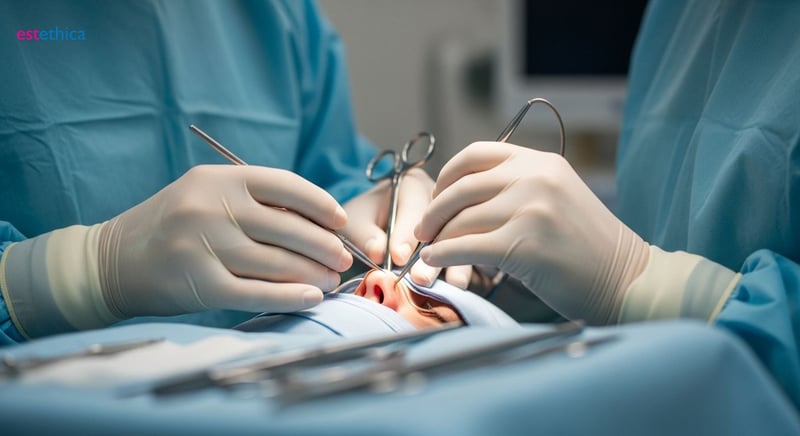Reshape Your Story: The Ultimate Guide to Rhinoplasty
Explore the ultimate guide to rhinoplasty, where beauty meets health. Understand procedures, benefits, and surgeon selection to reshape your story.
Rhinoplasty, commonly known as a nose job, is more than just a cosmetic procedure. It’s about reshaping your story and enhancing your natural beauty while addressing any functional issues. Understanding what rhinoplasty entails can empower you to make informed decisions about your health and confidence.
Rhinoplasty Unveiled: Understanding the Nose Job Procedure
Exploring the Fundamentals of Rhinoplasty
Rhinoplasty, commonly known as a nose job or nose surgery, is a surgical procedure with the dual purpose of improving both the aesthetic appearance of the nose and its functionality. Nasal surgery can address a multitude of concerns, ranging from correcting breathing difficulties to reshaping the nose for enhanced facial harmony. This procedure is highly personalized, taking into account the patient's unique facial structure and desired outcomes.
Whether the need arises to correct a birth defect, repair damage from an injury, or simply refine the nose's appearance, rhinoplasty offers a tailored approach. The goals and techniques utilized during rhinoplasty should be openly discussed with the surgeon to ensure satisfaction. A successful rhinoplasty not only meets aesthetic goals but also improves the patient's quality of life by addressing functional issues. The American Society of Plastic Surgeons reports that satisfaction rates after rhinoplasty are around 85%, highlighting its effectiveness.
Common Objectives of Nasal Surgery
- Correcting Breathing Problems: Nasal surgery can open up nasal passages, making breathing easier and improving overall respiratory function. This is particularly beneficial for those suffering from chronic congestion or sleep apnea.
- Reshaping the Nose: Rhinoplasty can alter the size, shape, and angle of the nose to better complement facial features. Whether it involves refining the tip, straightening the bridge, or reducing the overall size, the goal is to create a more balanced and aesthetically pleasing appearance.
- Repairing Injuries: Trauma to the nose can result in deformities and breathing problems. Rhinoplasty can reconstruct the nose, restoring its original shape and function, which is vital for both appearance and health.

Beyond Aesthetics: Exploring the Functional Benefits of Nasal Surgery
Functional Improvements Through Rhinoplasty
While rhinoplasty is often seen as a cosmetic procedure, its benefits extend far beyond aesthetics. Nasal surgery can significantly improve breathing, correct structural issues, and enhance overall nasal function. This makes rhinoplasty a valuable option for those seeking both aesthetic enhancements and functional improvements. Individuals who undergo rhinoplasty often find that their enhanced appearance is matched by newfound ease in breathing and improved quality of life.
Many individuals opt for rhinoplasty to address functional issues such as a deviated septum, which can obstruct airflow and lead to breathing difficulties. By correcting these structural problems, rhinoplasty improves respiratory function, reduces snoring, and alleviates chronic congestion. In some cases, rhinoplasty is deemed medically necessary, particularly when breathing impediments impact daily life. The transformation achieved through rhinoplasty can be life-changing, as patients experience a harmonious blend of improved aesthetics and enhanced physical well-being.
Exploring Corrective Nasal Procedures
- Septoplasty for Deviated Septum: Septoplasty is frequently performed alongside rhinoplasty to correct a deviated septum, greatly improving airflow.
- Turbinate Reduction to Enhance Airflow: Rhinoplasty can include turbinate reduction, a surgical technique that reduces the size of the turbinates, which are structures inside the nose that help to humidify and filter the air you breathe. By reducing enlarged turbinates, airflow through the nasal passages can be significantly improved.
- Nasal Valve Correction: A rhinoplasty can address and reinforce weak or collapsed nasal valves. These valves, which control airflow into the nose, can sometimes collapse during inhalation, leading to breathing difficulties. By correcting these valves, patients often experience significant improvement in their nasal breathing.

Rhinoplasty Recovery Time: What to Expect After Nose Surgery
Navigating the Post-Operative Phase After Rhinoplasty
Post-operative care is crucial for ensuring smooth recovery from rhinoplasty. Patients can expect initial bruising and swelling, with a gradual return to normal activities over a few weeks. Following your surgeon’s advice is key to ensuring optimal healing. Rhinoplasty, like any surgical procedure, requires a period of recovery where patience and adherence to medical advice are paramount. Patients should prepare for this phase by arranging for support, understanding the healing timeline, and setting realistic expectations.
During the initial days following a nose job, rest and careful management of any discomfort are important. As the swelling subsides, the new shape of the nose will gradually become more apparent, revealing the refined aesthetic achieved through the surgery. The success of the rhinoplasty not only depends on the surgeon's skill but also on the patient's dedication to following post-operative instructions, making it a collaborative effort toward achieving the best possible outcome.
Essential Steps for a Smooth Rhinoplasty Recovery
- Adhering to Medication Protocols: The prescribed medications help manage pain and prevent infection, playing a crucial role in comfort and healing.
- Attending Follow-Up Appointments: Regular check-ups with your surgeon allow for monitoring of the healing process and timely intervention if any issues arise. These appointments are essential to ensure optimal results and address any concerns promptly.
- Gentle Nasal Care: Gentle cleaning and care of the nasal area, as instructed by your surgeon, are important to prevent infection and promote healing. Avoid any actions that could disrupt the healing tissues.
Taking these steps ensures that patients experience a comfortable and successful rhinoplasty recovery journey while minimizing potential complications.
Lifestyle Adjustments During Recovery
- Avoid Strenuous Activities: Refrain from heavy lifting, intense exercise, and any activity that could increase blood pressure or risk trauma to the nose during initial recovery.
- Sleeping with Elevated Head: Using extra pillows to keep your head elevated while sleeping reduces swelling and promotes drainage. This position helps minimize discomfort and supports the healing process.
- Sun Protection for Incisions: Protecting incisions from direct sunlight can prevent hyperpigmentation and ensure optimal scar appearance. Use sunscreen and wear a hat when outdoors to shield the healing tissues.

Finding Your Expert: Choosing the Best Rhinoplasty Surgeon
Key Traits of a Qualified Rhinoplasty Surgeon
Selecting the right surgeon is critical to the success of your rhinoplasty journey. Ideal candidates have a demonstrated history of effective results, as evidenced by comprehensive patient testimonials and before-and-after photos. Board certification ensures that the surgeon has met rigorous standards of education, training, and expertise in rhinoplasty. A surgeon's approach to creating natural-looking results that suit each individual's facial structure is also important.
During your consultation, assess the surgeon's communication style, ensuring they listen to your goals and provide clear, understandable explanations. The surgeon should conduct a thorough evaluation of your nasal structure and discuss realistic expectations for the outcome. Developing a sense of trust and confidence in your surgeon is essential, as it fosters a collaborative partnership aimed at achieving your desired results.
Evaluating Potential Surgeons for Nasal Surgery
- Surgical Experience: Prioritize surgeons who perform rhinoplasty regularly, showcasing their focused expertise. Evaluate their work through detailed before-and-after galleries, ensuring their aesthetic aligns with your goals and preferences.
- Patient Testimonials: Seek reviews detailing patient experiences regarding the surgeon's bedside manner, pre- and post-operative support, and overall satisfaction with the procedure's results.
- Board Certification Verification: Confirm the surgeon’s board certification with relevant medical boards to validate their qualifications and adherence to professional standards.
Steps to Finding the Right Surgeon
- Initial Consultation: Schedule consultations with multiple surgeons to assess their communication style and approach. This face-to-face interaction is critical for evaluating compatibility and trust.
- Review of Surgical Portfolio: Carefully examine the surgeon’s portfolio, paying close attention to cases similar to your own. Analyze the subtle nuances and overall aesthetic outcomes achieved.
- Discussion of Surgical Techniques: Engage in a thorough discussion about the specific techniques the surgeon intends to use during your nose job, ensuring a clear understanding of their methods and expected results.
Understanding Rhinoplasty: A Comprehensive Guide
Advanced Rhinoplasty: Combining Septoplasty, Turbinate Reduction, and Nasal Valve Correction for Enhanced Function and Aesthetics
Patient-Centric Rhinoplasty: Ensuring a Smooth Recovery and Lasting Results
Frequently Asked Questions
What is rhinoplasty and what does it involve?
What are the functional benefits of nasal surgery beyond aesthetics?
What is the typical rhinoplasty recovery time and what should I expect?
How do I choose the best rhinoplasty surgeon for my needs?
What is the role of septoplasty in improving breathing during rhinoplasty?
Achieve your aesthetic goals with personalized guidance from estethica's expert team.
📞 Get Your Free Consultation!